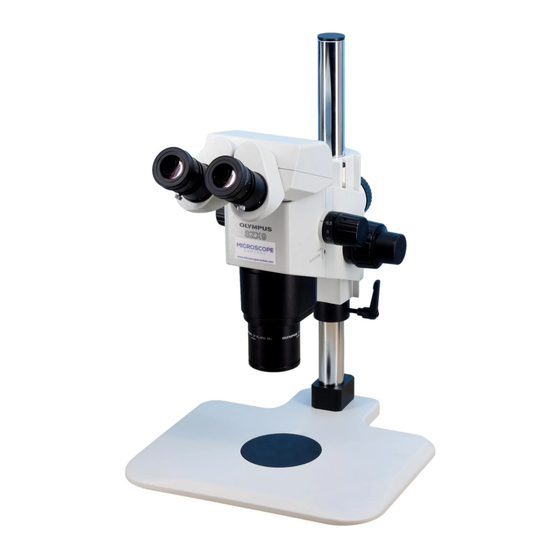Olympus SZH-STAD1 Anleitung Handbuch - Seite 2
Blättern Sie online oder laden Sie pdf Anleitung Handbuch für Mikroskop Olympus SZH-STAD1 herunter. Olympus SZH-STAD1 34 Seiten. Research stereomicroscope system

IMPORTANT
SAFETY PRECAUTIONS
30°
Fig. 1
1
Getting Ready
²
Fig. 2
1. To prevent the microscope body from turning over, its pivot angle must
be limited to 30° as shown in Fig. 1.
2. Sufficient care is required during observation with a magnification objec-
tive, because the objective´s long working distance can displace the
microscope body to a higher position. Care is also required when using
an auxiliary pillar (SZH-P400/P600), which also makes the microscope
body unstable.
@
3. To adjust the microscope body height, be sure to hold the focusing as-
sembly with one hand while loosening the focusing assembly clamping
knob @. (Fig. 1)
(Use the drop prevention collar (SZX-R) to prevent a hazard from occurring.)
<Be careful not to pinch your finger during adjustment.>
1. A microscope is a precision instrument. Handle it with care and avoid
subjecting it to sudden or severe impact.
2. Do not use the microscope where it is subjected to direct sunlight, high
temperature and humidity, or vibration. (For operating environment, see
Section 6, "Specifications" on page 16.)
3. Observe the following cautions when operating the coarse or fine focus
³
adjustment knobs or the zooming knob.
@
Operation
Focusing
Zooming
Manipulated Controls
Coarse/fine focus ad-
justment knobs @
(Fig. 2)
Zooming knob ²
(Fig. 2)
i
Caution
1. If the knob hits the upper or lower
limiting mechanism violently or
it is rotated after it hits a limiting
mechanism, the internal mecha-
nism may be damaged.
2. If the knobs on the left and right
are rotated in opposite directions,
the internal mechanism will be
damaged. (The tension of the
coarse focus adjustment knob
should be adjusted using the
tension adjustment ring ³ on the
knob.)
1. If the knob hits the upper or lower
limiting mechanism violently or
it is rotated after it has hit a limit-
ing mechanism, the internal
mechanism may be damaged.
2. If the knobs on the left and right
are rotated in opposite directions,
the internal mechanism will be
damaged.
